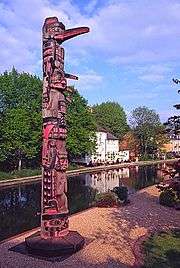Henry Hunt (artist)
Henry Hunt (16 October 1923 – 13 March 1985) was a First Nations woodcarver and artist from the Kwakwaka'wakw (formerly "Kwakiutl") people of coastal British Columbia.[1]
Henry Hunt | |
|---|---|
.jpg) | |
| Born | 16 October 1923 Fort Rupert, British Columbia, Canada |
| Died | 13 March 1985 (aged 61) Victoria, British Columbia, Canada |
| Nationality | Canadian |
| Known for | Woodcarver |
He was born in 1923 in the Kwakwaka'wakw community of Fort Rupert, B.C. He was a descendant of the renowned ethnologist George Hunt. Hunt was originally a logger and fishermen but went to Victoria to help his father-in-law Mungo Martin at the British Columbia Provincial Museum in Victoria in 1954, where he remained until 1974. He succeeded Mungo Martin there as chief carver in 1962.

Hunt followed the Kwakwaka'wakw carving tradition, using minimum paint, deep cuts with traditional tools. He carved a number of totem poles. Hunt's works can be seen at the Thunderbird Park and around the world, including a pole in the town of Berkhamsted, England.[2]
He was the father of the artists Henry, Jr., Shirley Ford, Tony Hunt, Richard Hunt, and Stanley C. Hunt.
He and Tony Hunt, his eldest son, carved a memorial pole to Mungo Martin at Alert Bay, B.C., in 1970–71.
Bibliography
- Hunt, Ross. (2007). "The Hunt Family's Trip to West Germany to Attend the Bundesgarten Show." Anthropology News, vol. 48, no. 2, pp. 20–21.
- Hawthorn, Audrey. (1988). Kwakiutl Art. University of Washington Press. ISBN 0-88894-612-0.
- Macnair, Peter L., Alan L. Hoover, and Kevin Neary. (1984). The Legacy: Tradition and Innovation in Northwest Coast Indian Art. Vancouver, B.C.: Douglas & McIntyre.
References
- Sheehan, Carol. "Henry Hunt". The Canadian Encyclopedia. Archived from the original on 20 March 2014.
- "Henry Hunt". Royal British Columbia Museum. Archived from the original on 20 March 2014.